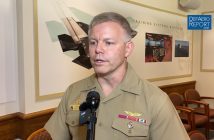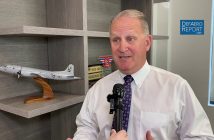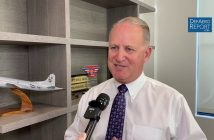Camille Grand, NATO assistant secretary general for defense investment, discusses accelerating alliance acquisition programs and more with Defense & Aerospace Report Editor Vago Muradian at NATO Allied Command Transformation’s 13th annual Chiefs of Transformation Conference in Norfolk, Va. Our coverage was sponsored by L3 Technologies and Leonardo DRS.
Camille Grand
Assistant Secretary General for Defence Investment
NATO
NATO ACT Chiefs of Transformation Conference
Norfolk, Virginia
December 2018
Vago Muradian: Welcome to the Defense and Aerospace Report. I’m Vago Muradian here at NATO Allied Command Transformation’s Annual Chiefs of Transformation Conference here in Norfolk, Virginia, the leading gathering of alliance innovators to talk about technology, policy, strategy, and much more. Our coverage here is sponsored by L3 Technologies and Leonardo DRS.
We’re honored to have with us Camille Grand, who is NATO’s Assistant Secretary General for Defence Investment. A very short title, Camille. It’s always a pleasure talking to you.
Everybody is talking about innovation in this sort of great power competition mode. The alliance is working very, very hard to improve its game as well. You met with Ellen Lord, the U.S. Acquisition and Sustainment Chief recently in Washington before you came here to Norfolk. She’s working to innovate increased speed.
Talk to us a little bit about the reforms you think and you’re undertaking in the NATO acquisition organization to drive innovation, to drive speed. Because at the end of the day everybody wants capability yesterday instead of ten years from today.
Camille Grand: We need to be good at delivering the capabilities to the warfighter at the speed of relevance, and we can no longer afford having an acquisition cycle that takes years. For that we’re doing three separate things.
One is, reform your own acquisition processes and we had a big effort to reform the way we manage common funding. And in order to reduce the number of decision points at 29, i.e. involving all 29 allies. Allies want to have control of the money that’s their money, it’s okay, but they’ve accepted to relinquish part of that control to exercise a better governance, but less micromanagement into the NATO common funded capabilities. So that’s one element.
The second element is to foster innovation across the board. And there the Allied Command for Transformation is an essential piece of this effort, but we also had [headquarters]establishing a small innovation unit, working with my colleagues on energy and security challenges to really make the headquarters a venue for innovators. Innovators from all nations, so the chief innovators in all of our nations, but also innovators from industry in order to be able to foster the best innovation in the societies that we have around.
And thirdly, it’s about the engagement with industry. We recently had the NATO Industry Forum in Berlin. It was a great success. We engaged non-traditional industries as well, and thanks to that we’ve been able to really create a dialogue with those in the industry that are offering some of the [official]commercial solutions that can be absolutely essential to NATO. Not only in IT per se which is obvious, and artificial intelligence, and big radar which are obvious fields of [strategic]energy that we need to look into if we don’t want to be lost by our adversary, but also in very different forms such as logistics and sustainment. This is where we can do a difference as well.
Mr. Muradian: What are the keys, as far as you’re concerned, what are the keys to innovation? Especially keys to innovation with 29 nations, each one of which have their own interests, industries, and different appetites for risk tolerance, for example?
ASG Grand: I think we need to be [inaudible]. Nations in the NATO environment are very different. There are those that have very large innovation organizations already in place in their government. So what we can do to foster innovation is to recognize that innovation [hubs]can be an opportunity. And from that perspective, I’m very confident that every single nation has a role to play in this conversation. Because when it comes to innovation, you can find in one of our smaller member states a very high-level lab that is working on artificial intelligence that’s going to be a key to tomorrow’s, or a benefit to tomorrow’s mastery of this technology and make the best possible use of it.
So from that perspective, I think it’s really important to share the best practice in the context of the Conference of National [Inaudible] Director. I’ve invited the nations to share with us their experience in fostering innovation in a national environment, and then to sort of bring that to the table.
I think the key driver here, and the Secretary General said that in his address to the Chief of Transformation Conference this morning, that we should not assume that we have the technology today over our potential adversaries forever. The West has been in this position, but we need to continue to do that in a context where innovation is also taking place in the commercial and civilian sector.
Mr. Muradian: Next year is the 70thanniversary of the alliance. There’s going to be a big event, obviously, in Washington. The Washington Treaty which founded the alliance. What are going to be some of your key goals, including alongside the United States and with the United States but also with other partner nations that you have on the agenda for 2019?
ASG Grand: Well, 2019 is obviously the 70thanniversary of the alliance. It’s an opportunity to display unity, common unity of effort and the importance of NATO for our security. It takes this in a context where there are major issues on the plate of the alliance in terms of debates starting with burden sharing. And on that front there is some good news in terms of the effort put by Europe and Canada to meet their two percent pledge in the run-up to 2024. So on that front I think things are moving in the right direction even if we are not quite there, obviously.
Next, I think we need also to put an end to this unreadiness. The issue of the readiness of our combat forces in an unpredictable environment is a key element. There, there is a key connection with capabilities and innovation. Can we, that the forces on the field are properly equipped at the speed of relevance.
Mr. Muradian: And you talked about the NATO Industry Forum, which was a very big success. Every year the event has been growing and growing and growing. Berlin was the last one. Is the next one going to be in Washington in 2019?
ASG Grand: Yes, indeed. We’ve had a very good series of NATO Industry Forums which are events that I’ve had the pleasure of co-hosting with the [Secretary] of Allied Transformation. We had an excellent one in Brussels in ’16. We had a wonderful one just a few months ago in Berlin, in November ’18. And now we are working on the next one which to mark the 70thanniversary will take place in Washington, and I’m extremely grateful for the Pentagon partnering with us to make this a success. So next November we will have the leaders of industry from the defense sector and beyond, and the leaders of NATO meeting in Washington to mark, to discuss innovation, the best way to deliver the capabilities for the alliance that we need.
Mr. Muradian: And one last question. You mentioned that you’ve gotten a little bit greater authority in order to be able to spend money. Do you need broader authority? Does your office need broader authority? Because if you think about it, when a military mission — once the alliance decides to do something its leaders are making life or death decisions with alliance members, and yet when it comes to acquisition programs unless they’re very very finely defined, it’s very hard to be able to get that broader authority to drive some of these multinational programs. And at a time, if you look at it, there are so many fighter, armored vehicle, all these sort of multinational programs that really will improve alliance capabilities at the end of the day.
Do you think that that’s the next change we need to be able to vest in your officer greater authority, that once everybody decides to do something you’re able to execute that and to execute it actually more quickly for the benefit of the entire alliance?
ASG Grand: The situation in the NATO environment is well known. Nations want to control resources. That is something that is very much at the core of a multinational alliance construct where nations own whatever project we develop. So from that perspective, the issue is not to change that governance. Governance belongs to nations [is there].
What we’re trying to do is to empower the host nations, which can be the NATO Communication Information Agency or the NATO Support and Procurement Agency, to work more closely with the strategic commands to empower the strategic commands to define the requirements and make those absolutely essential governance decisions at 29 take place only when needed, which would be a change from a situation where nations felt that they wanted to have the decision, many, many, many decision points on any adjustments. So we’re introducing tolerances but with those additional responsibilities come also additional accountability, and this is where the strategic commands, the agencies, will have to demonstrate that they can do well with the new powers entrusted in them.
Mr. Muradian: And also with the new capability requirement that goes now, is inherent in ACT. You now have a much closer partner in order to be able to develop your own agenda from an alliance-wide standpoint.
ASG Grand: I think the clarification between ACO and ACT on the responsibilities when it comes to military requirements is absolutely essential, because it enables us to have a much clearer line of command. Where one strategic command might be in responsibility at a certain point for breaking the capability, of defining the personnel requirements, but there is much clearer lines of responsibility, and a core role for ACT that I think enables us to move away from a form of [inaudible]governance that was not that satisfactory and contributed to [inaudible].
Mr. Muradian: Camille Grand, the Assistant Secretary General for Defense Investment in NATO, sir, it’s always a pleasure. I hope you have a very merry Christmas and a happy new year.
30




